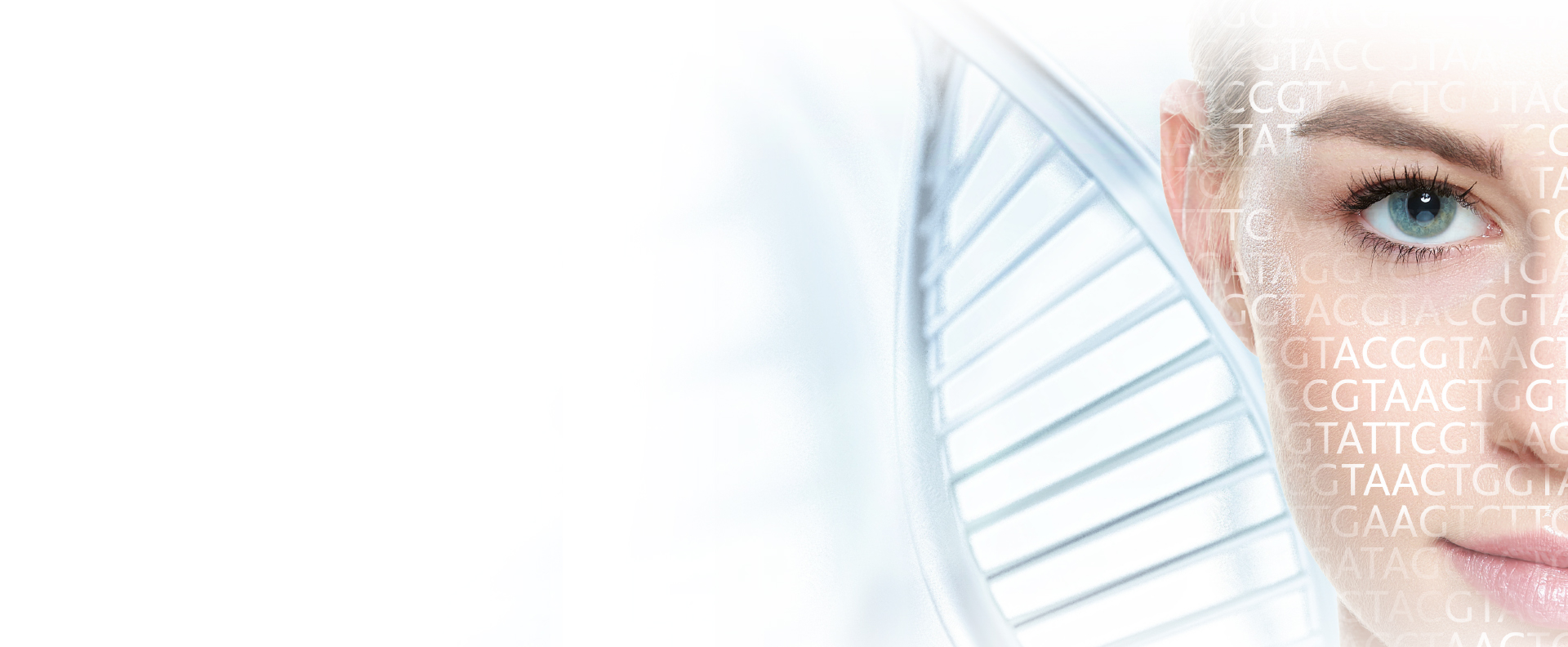IllnessBardet-Biedl syndrome, differential diagnosis I
Summary
Comprehensive differential diagnostic panel for Bardet-Biedl syndrome containing 15 or 27 curated genes according to the clinical signs
| Locus type | Count |
|---|---|
| Gen | 23 |
59,1 kb (Extended panel: incl. additional genes)
- EDTA-anticoagulated blood (3-5 ml)
NGS +
Loci
Gen
| Name | Exon Length (bp) | OMIM-G | Referenz-Seq. | Heredity |
|---|---|---|---|---|
| ARL6 | 561 | NM_177976.3 | AR, digenisch | |
| BBS1 | 1782 | NM_024649.5 | AR, digenisch | |
| BBS10 | 2172 | NM_024685.4 | AR | |
| BBS12 | 2133 | NM_152618.3 | AR | |
| BBS2 | 2166 | NM_031885.5 | AR | |
| BBS4 | 1560 | NM_033028.5 | AR | |
| BBS5 | 1026 | NM_152384.3 | AR | |
| BBS7 | 2148 | NM_176824.3 | AR | |
| BBS9 | 2664 | NM_198428.3 | AR | |
| CEP290 | 7440 | NM_025114.4 | AR | |
| CFAP418 | 624 | NM_177965.4 | AR | |
| MKKS | 1713 | NM_018848.3 | AR | |
| MKS1 | 1680 | NM_017777.4 | AR | |
| SDCCAG8 | 2142 | NM_006642.5 | AR | |
| TTC8 | 1518 | NM_198309.3 | AR | |
| ALMS1 | 12504 | NM_015120.4 | AR | |
| BBIP1 | 279 | NM_001195306.2 | AR | |
| IFT172 | 5250 | NM_015662.3 | AR | |
| IFT27 | 558 | NM_006860.5 | AR | |
| IFT74 | 3008 | NM_001099222.3 | AR | |
| LZTFL1 | 900 | NM_020347.4 | AR | |
| TMEM67 | 2988 | NM_153704.6 | AR | |
| WDPCP | 2241 | NM_015910.7 | AR |
Informations about the disease
Bardet-Biedl syndrome (BBS) is a rare genetic disease that affects several body systems in childhood: Overweight, intellectual impairment, kidney, eye and genital abnormalities and sometimes polydactyly. The severity of the symptoms varies considerably, even between family members. Heredity is usually autosomal recessive with incomplete penetrance. Even after examination of over 20 potentially mutated genes, no genetic cause is found in 20-30% of patients.
Reference: https://www.ncbi.nlm.nih.gov/books/NBK1363/
- Ciliopathy, genetically heterogeneous
- Sympt.: Retinitis pigmentosa, obesity, kidney + behavioral dysfunction, hypogonadism, polydactyly
- Allelic: Alstrom syndrome (ALMS1)
- Allelic: Bardet-Biedl syndrome 1, modifier of (ARL6)
- Allelic: Bardet-Biedl syndrome 14, modifier of (TMEM67)
- Allelic: Cone-rod dystrophy 16 (CFAP418)
- Allelic: Congenital heart defects, hamartomas of tongue + polysyndactyly (WDPCP)
- Allelic: Joubert syndome 5 (CEP290)
- Allelic: Joubert syndrome 28 (MKS1)
- Allelic: Leber cong. amaurosis 10 (CEP290)
- Allelic: McKusick-Kaufman syndrome (MKKS)
- Allelic: Meckel syndrome 1 (MKS1)
- Allelic: Meckel syndrome 4 (CEP290)
- Allelic: Muscular dystrophy, limb-girdle, AR 8 (TRIM32)
- Allelic: Nephronophthisis 15 (CEP164)
- Allelic: Oro-facio-digital syndrome type IX [panelapp green] (SCLT1)
- Allelic: Retinitis pigmentosa 55 (ARL6)
- Allelic: Retinitis pigmentosa 64 (CFAP418)
- Allelic: Retinitis pigmentosa 71 (IFT1732)
- Allelic: Retinitis pigmentosa 74 (BBS2)
- Allelic: Senior-Loken 6 (CEP290)
- Allelic: Senior-Loken syndrome 7 (SDCCAG8)
- Allelic: Senior-Løken syndrome [panelapp green] (SCLT1)
- Allelic: Short-rib thoracic dysplasia 10 with/-out polydactyly (IFT172)
- Bardet-Biedl syndrome 1 (BBS1)
- Bardet-Biedl syndrome 10 (BBS10)
- Bardet-Biedl syndrome 11 (TRIM32)
- Bardet-Biedl syndrome 12 (BBS12)
- Bardet-Biedl syndrome 13 (MKS1)
- Bardet-Biedl syndrome 14 (CEP290)
- Bardet-Biedl syndrome 15 (WDPCP)
- Bardet-Biedl syndrome 16 (SDCCAG8)
- Bardet-Biedl syndrome 17 (LZTFL1)
- Bardet-Biedl syndrome 18 (BBIP1)
- Bardet-Biedl syndrome 19 (IFT27)
- Bardet-Biedl syndrome 2 (BBS2)
- Bardet-Biedl syndrome 20 (IFT172)
- Bardet-Biedl syndrome 21 (CFAP418)
- Bardet-Biedl syndrome 22 (IFT74)
- Bardet-Biedl syndrome 3 (ARL6)
- Bardet-Biedl syndrome 4 (BBS4)
- Bardet-Biedl syndrome 5 (BBS5)
- Bardet-Biedl syndrome 6 (MKKS)
- Bardet-Biedl syndrome 7 (BBS7)
- Bardet-Biedl syndrome 8 (TTC8)
- Bardet-Biedl syndrome 9 (BBS9)
- AR
- digenisch
- Multiple OMIM-Ps
Bioinformatics and clinical interpretation
Test-Stärken
- DAkkS-akkreditiertes Labor
- EU-Richtlinie für IVD in Umsetzung
- Qualitäts-kontrolliert arbeitendes Personal
- Leistungsstarke Sequenzierungstechnologien, fortschrittliche Target-Anreicherungsmethoden und Präzisions-Bioinformatik-Pipelines sorgen für überragende analytische Leistung
- Sorgfältige Kuratierung klinisch relevanter und wissenschaftlich begründeter Gen-Panels
- eine Vielzahl nicht Protein-kodierender Varianten, die in unseren klinischen NGS-Tests mit erfasst werden
- unser strenges Variantenklassifizierungsschema nach ACMG-Kriterien
- unser systematischer klinischer Interpretations-Workflow mit proprietärer Software ermöglicht die genaue und nachvollziehbare Verarbeitung von NGS-Daten
- unsere umfassenden klinischen Aussagen
Testeinschränkungen
- Gene mit eingeschränkter Abdeckung werden gekennzeichnet
- Gene mit kompletten oder partiellen Duplikationen werden gekennzeichnet
- es wird angenommen, dass ein Gen suboptimal abgedeckt ist, wenn >90% der Nukleotide des Gens bei einem Mapping-Qualitätsfaktor von >20 (MQ>20) nicht abgedeckt sind
- die Sensitivität der Diagnostik zur Erkennung von Varianten mit genannten Testeinschränkungen ist möglicherweise begrenzt bei:
- Gen-Konversionen
- komplexe Inversionen
- Balancierte Translokationen
- Mitochondriale Varianten
- Repeat-Expansionen, sofern nicht anders dokumentiert
- nicht kodierende Varianten, die Krankheiten verursachen, die von diesem Panel nicht mit abgedeckt werden
- niedriger Mosaik-Status
- Repeat-Blöcke von Mononukleotiden
- Indels >50bp (Insertionen-Deletionen)
- Deletionen oder Duplikationen einzelner Exons
- Varianten innerhalb von Pseudogenen
- die analytische Sensitivität kann geringer ausfallen werden, wenn die DNA nicht von amedes genetics extrahiert wurde
Laboratory requirement
Die in grün gezeigten Gene sind kuratiert und werden als Gen-Panel untersucht. Eine Erweiterung des Panels (blau gezeigte Gene, jeweils ebenfalls kuratiert) kann auf Anfrage erfolgen. Sofern unter "Erweitertes Panel" ein Minuszeichen angezeigt wird, sind nur Core-/Basis-Gene verfügbar.
Für die Anforderung einer genetischen Untersuchung senden Sie uns bitte die Krankheits-ID auf einem Überweisungsschein. Bitte die Material-Angabe beachten.
Für privat versicherte Patienten empfehlen wir einen Antrag auf Kostenübernahme bei der Krankenversicherung.
Die Untersuchung wird auch für Selbstzahler angeboten.

